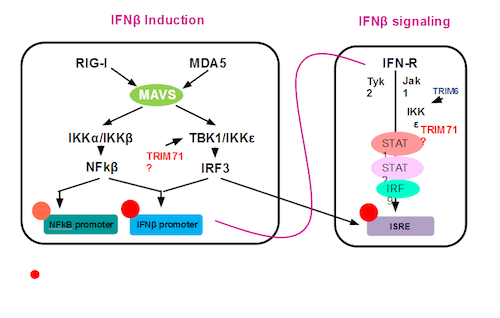Associate Scientist
danae.fonseca@mssm.edu
Research Interests
Viral infection triggers a fast and effective cellular response mediated primarily by the production of INFβ that induces an anti-viral state through complex signal cascades. Therefore, the regulation of its induction and subsequent IFNβ signaling needs to be tightly controlled. There is growing evidence implicating the members of Tripartite-motif (TRIM) protein family of E3 ligases as critical players in this regulation. However, the exact role, mechanism of action, and the physiological relevance of their activity in vivo still remain poorly understood. Previous work in our lab revealed that a large number of TRIMs play critical roles as enhancers in the regulation of innate immune signaling pathways. My research focuses on the study of TRIM71 and its role in innate immune signaling. It was previously shown that TRIM71 overexpression strongly increased the 2CARD-RIG-I-dependent activation of the INFβ and ISRE promoters. I am now investigating the specific level at which TRIM71 exerts its function, whether its E3 ubiquitin-ligase activity is important for its function, and its potential substrates in order to delineate the molecular mechanism by which it regulates responses to viral infection.
Notable Publications
Danae Fonseca, Jorge Baquero, Michael R. Murphy, Gamage Aruggoda, Sophia Varriano, Carmen Sapienza, Oksana Mashadova, Shadaqur Rahman, and Frida E. Kleiman. The mRNA processing factor CstF-50 and ubiquitin escort factor p97 are BRCA1/BARD1 cofactors involved in chromatin remodeling during DNA damage response. Molecular and Cellular Biology, Accepted manuscript posted online November 27, 2017.
Fathima Nazeer, Emral Devany, Samia Mohammed, Danae Fonseca, Bernardine Akukwe, Carmen Taveras and Frida Kleiman. p53 inhibits mRNA 3′ processing through its interaction with the CstF/BARD1 complex. Oncogene, 30(27):3073-83 (2011).
Nurit Mirkin , Danae Fonseca, Samia Mohammed, Murat Cevher, James Manley, and Frida Kleiman. The 3’ processing factor CstF functions in the DNA repair response. Nucleic Acids Research, 36 (6): 1792-804 (2008).
*The authors wish it to be known that, in their opinion, the first two authors should be regarded as joint First Authors.
Ho-Shik Kim, Hongjie Li, Murat Cevher, Alissa Parmelee, Danae Fonseca, Frida Kleiman and Sean Bong Lee. DNA damage-induced BARD1 phosphorylation is critical for the inhibition of messenger RNA processing by BRCA1/BARD1 complex. Cancer Research, 66 (9): 4561-4565 (2006).
Frida Kleiman, Foon Wu-Baer, Danae Fonseca, Syuzo Kaneko, Richard Baer and James Manley. BRCA1/BARD1 inhibition of 3’ processing involves targeted degradation of RNA Polymerase II. Genes and Development, 19: 1227-1237 (2005).

